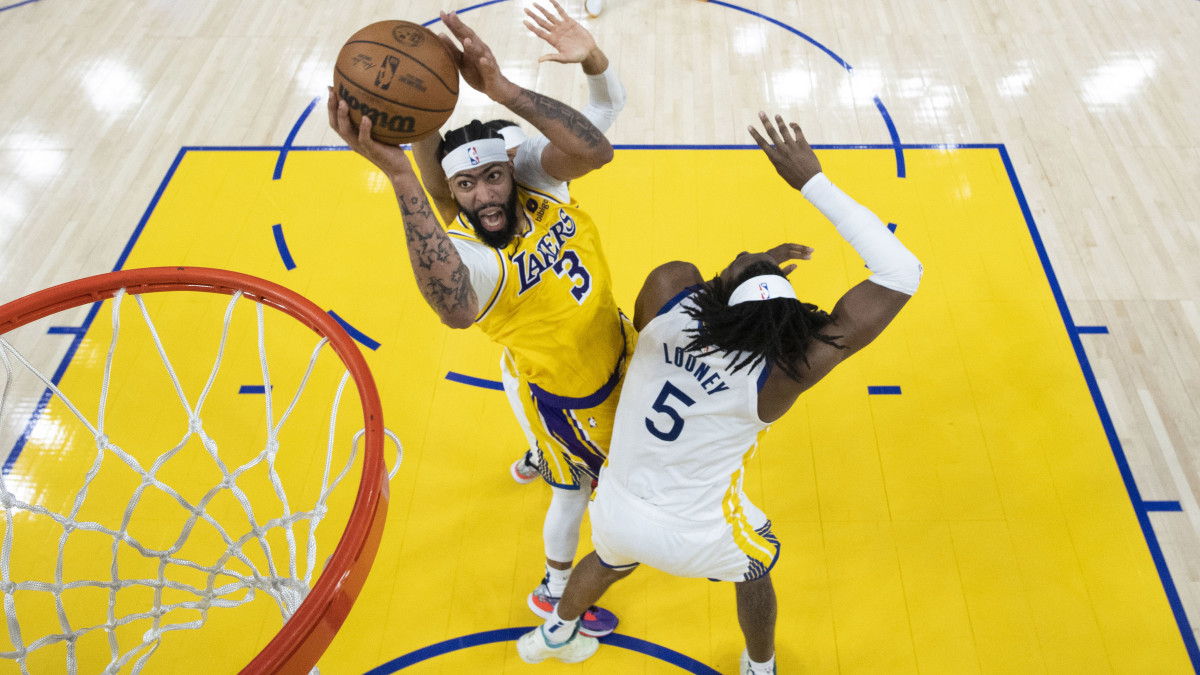Anthony Davis’s Early Exit Looms Large Ahead of Lakers’ Game 6

Even before this season—before we knew that the Lakers would trade Russell Westbrook or that they’d go on a late-season run and look like a contender—it wouldn’t have been a stretch to say that the club’s campaign would ultimately come down to Anthony Davis’s health.
Following Wednesday night’s outcome—the defending champion Warriors won at home to force Game 6— it now looks like we’re at that point. Midway through the fourth quarter of Game 5, the Los Angeles superstar took an inadvertent blow to the temple from Golden State center Kevon Looney, immediately grabbing his face in pain. After going over to the bench to take a seat and get looked at briefly by an athletic trainer, he seemed to woozily get back to his feet.
“Guys, Anthony Davis was wheeled out on a wheelchair,” TNT sideline reporter Chris Haynes said toward the tail end of the game broadcast. “I believe he’s headed to the locker room for further evaluation, but it didn’t look good.”
The Lakers stopped short of diagnosing Davis with a concussion, with sources telling Haynes he appeared to avoid one. Separately, ESPN’s Dave McMenamin wrote that a source close to Davis said there was no mention of a concussion following his initial evaluation.
Still, with a massive Game 6 looming on Friday—and Davis potentially unavailable depending on whether he enters concussion protocol—it is fair to wonder whether the anonymous phrasing might be calculated semantics to leave Davis and the Lakers flexibility.
After all, when parsing postgame video of Davis leaving the Chase Center for the team bus, you hear a man asking a videographer to turn off his lights as Davis slowly walks by—something that might be done to limit the impact on someone who’s suffering from a concussion. And that came after Haynes’s in-game report that Davis had been wheeled out with a towel over his head. Before Haynes reported that Davis needed a wheelchair at one point, he said, “He didn’t look as stable, and needed a little bit of help walking, and [appeared] to be a little bit dizzy” on the way to being evaluated inside the arena. Given all that, the possibility of Davis having a concussion, while not certain, sounded quite high. And despite the stakes, his well-being matters beyond Game 6—particularly for someone who’s dealt with so many injury close calls his entire career.
The sports world is understandably skeptical at times over how possible concussions are handled in real time. Former Clippers guard Reggie Jackson, for instance, took this scary fall against Portland earlier in the regular season. His head appeared to snap back and hit the hardwood on the play. He then staggered to his feet before realizing he couldn’t stand yet and tumbled back over. He ended up returning to the game after the half and told reporters after the contest that he never underwent any concussion testing, because he felt pain more in his back than anywhere else. Far more talked about, though, was the Tua Tagovailoa situation in the NFL—one that the Dolphins, back in September, initially explained was a back issue and not a concussion. But as questions intensified and the Miami quarterback continued to suffer from concussions, he was forced to miss the end of the Dolphins’ season.

If Davis can’t go for Game 6 or isn’t his usual, disruptive self, it’ll obviously be an advantage for the Warriors, who’ve been trying their best to limit his impact all series. He logged 30 points and 23 rebounds in Game 1; 25 points, 13 points and four blocks in Game 3; and 23 points, 15 rebounds and three steals in Game 4. But Golden State has found solid success offensively by playing with tempo and having Steph Curry run pick-and-rolls with whoever Davis is guarding to pull him from the basket as a rim protector. Between those things and using JaMychal Green in Game 2, it’s opened up things on the back side against the highly stingy Lakers defense. (Many will remember the 2018 conference finals, where the Rockets took a 3–2 lead on the Dubs but lost Chris Paul to a hamstring in the final minute of Game 5, fundamentally altering the series.)
During the season, Los Angeles went 12–14 (46.1% winning percentage) in games without Davis, down from 31–25 (55.3%) in games with him. LeBron James has notched 21 points or more in all five games so far. The club has had a number of different players—ranging from D’Angelo Russell, Dennis Schröder and Lonnie Walker IV in Game 4—step up as third scorers.
